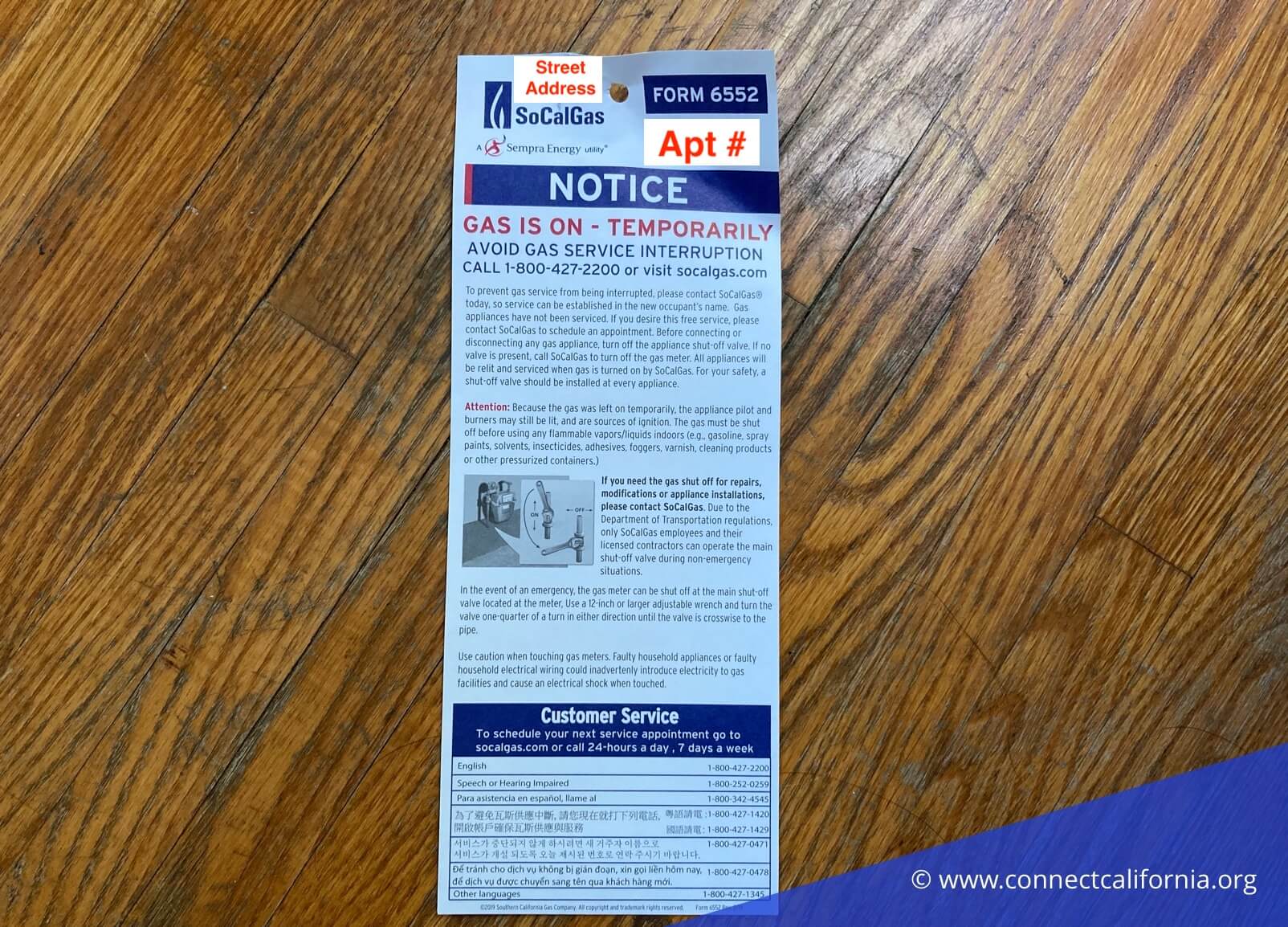If you’re thinking about renting in California, you may be wondering who is responsible for the gas bill: you, or your landlord?
The tenant is almost always responsible for the gas bill in California, and will need to set up an account with the local gas utility company upon move-in. There may also be contractual reasons in place or a shared meter that pass this responsibility to the landlord. In these cases, gas will be either included in rent or added on as a fee by your landlord, according to calculations described in your lease.
In either case, the state law provides some specific protections to tenants regarding the bill and the gas supply to ensure that you do not lose access to gas for circumstances beyond your control, or overpay to a middleman.
California also maintains strict requirements for shared utility billing (California Civil Code section 1940.9), to protect tenants from overpaying or subsidizing service in other units. 1
Disclaimer
This page is not intended to provide legal advice. Always seek out professional guidance from a certified source such as a lawyer, local housing department, or tenants union.

Who Is Responsible For The Gas Bill In California?
In most cases, the tenant will be responsible for paying the gas bill when renting a home or apartment in California.
There are two exceptions to this rule:
- Buildings or units which offer all-inclusive utility billing.
- Shared metering in multi-dweller units.
With apartments, shared metering is more common but not the norm.
First, you can sign a contract with a landlord that includes your utilities. This means that you pay the landlord a fixed (or variable based on reported billing) sum each month for the utilities and they take care of the account management, payment to provider, etc.
If you do have such a contract you still have the legal right to know how much is being spent on these utilities and which company is providing the utility and the landlord may only charge a small additional payment for administrative purposes.
However, if your payment is $3,000 a month including utilities and there is no breakdown of share for utilities in your contract – it may be difficult to enforce this in practice.
Second, there is also the possibility of a “shared meter” present in some properties.
Shared gas metering in California
A shared meter is a meter for a utility which serves several properties under one owner. For example, if a landlord buys a house to convert to apartments – they are not obliged to install separate meters for each of the new apartments, and they can continue to use a single meter.
This is completely legal. However, your landlord is obliged to tell you, before you move in, that you are living in a shared meter accommodation and what percentage of that meter reading you are expected to pay each month. This should be agreed in writing.
When you are billed under these circumstances, your landlord is legally required to share the meter reading from both the beginning of a month and the end of that month plus the current rate they are paying the gas service provider for the service.
In these circumstances you are referred to as a “sub-metered tenant”. You do not have any formal relationship with the gas company and any complaints regarding the service need to be made via your landlord, who is responsible for the billing account.
This arrangement is very common in California and it usually works without any real problems. It’s a little more admin for a landlord but not so much that it becomes burdensome and it saves them from paying for the installation of multiple meters.
The main risk for the tenant is that if you have variable (usage-based) billing in your lease agreement, remember that the cost can go up dramatically during the winter, or if you’re using lots of gas for another reason. The bill may be around $20 in the summer, but if you’re using gas for heat, that could easily go up into the low hundreds during the winter (although less than $100 is more normal).
What Happens If The Landlord Doesn’t Pay The Shared Meter Bill?
As we’ve already noted, when you are in a sub-metered tenancy, you’re not the client of the utility company and thus, if your landlord stops paying them – you can’t do very much about that.
Fortunately, California law recognizes that this can happen when a landlord either ends up in foreclosure or chooses to stop paying the bill for any other reason. In this instance, you are afforded some protection under the law.
The California Public Utilities code makes provisions for you to elect to become a customer of the gas utility, if your landlord fails to keep the account in good standing. However, if you’re sharing a meter and don’t want the expense of installing an individual meter, you would need to agree with the other tenants as to whom the bill would belong to, since they only allow one named customer.
The good news is that if you have to become a direct customer of the utility company, they cannot hold you responsible for any of your landlord’s outstanding debts. You cannot be asked to pay towards this in any way.
All that said, it’s worth noting that the utility company cannot return any money collected by your landlord for the purpose of paying the utility bill, even if it was not used to pay that bill. So, don’t expect any refunds from this process, either.
How Much Can A Landlord Charge For Utility Gas Service In California?
There is always a danger in cases like these of putting a precise figure on a particular charge because then if market circumstances change the charge may become unfair on either the landlord or the tenant.
So, the California Public Utilities Code does not specify a precise charging mechanism. What it does do is say that the landlord may only charge a tenant the same amount as they have been charged by the utility company and that they may add a “small fee” for the costs of creating an invoice for each tenant and for managing that account.
This fee is capped at the amount that it would “reasonably cost the utility company” to manage an account and the related servicing.
The best way to deal with this, of course, is to have this fee agreed and laid out in the tenancy contract before you move in to the property.
Your Rights Regarding The gas Bill
Your gas bill also has to provide some specific information for sub-metered tenants:
- The billing rate of the utility provide which must be the same as the rate you are being charged for the service
- The opening and closing meter readings of any period
- A clear explanation of all rates and quantities on the invoice
- How much the charges are for the period of billing
- The name, address and phone number of the ultimate billing authority
- Any rebates that have been applied to the account and your share of any such rebate should be deducted from the bill
- Any reductions that have been applied to the account for low energy use and these reductions should be reflected in the charges you are asked to pay
Your landlord is also obliged to keep records of the last 12 months (at a minimum — there is no maximum period) and these records must be available for inspect by you and/or by the County Sealer at a reasonable time if requested.
If any of the charges relate to the installation, repair or maintenance of the meter — they must also provide the County Department of Weights and Measures so that the meter can be thoroughly tested and there is no grounds to believe that the meter reading is inaccurate.
Is There A Discount On Medical Grounds?
The California Pacific Gas and Electric Company does allow residents of the state to apply for medical baseline assistance on either gas or electricity.
This is provided when you or another resident of your home requires life support within the home. Of course, there is an expectation that you will provide proof of this, usually through a signed document from a California-licensed doctor, stating that such equipment is needed and has been installed in your home.
There are also individuals with certain conditions such as paralysis or multiple sclerosis who may qualify for a discount because their treatment demands specific levels of heating and/or cooling available within the home.
There is a “baseline” rate which is set low for low usage on the utility bill by PG&E and this applies to all their customers. If you’re in the medical reduction program you can expect this rate to apply to an additional 25 therms of gas usage over and above the standard amount.
Who Connects The Gas In California? The Tenant or The Landlord?
In the instance that a meter and connection has not been provided – it would be the landlord who would be responsible for providing the connection as it requires a possible modification of the property to install gas service.
The only time when this would not be the case is if the tenant assumed responsibility for this in the tenancy agreement. One thing that’s absolutely certain about gas connections, charges, etc. is that life is easier for everyone if they form part of your written contract with the landlord.
Tenants have strong legal protection around gas service in California
Who is responsible for the gas bill in California? Under most circumstances, the tenant will pay the gas bill in a Californian property that they rent. The landlord will only be paying it if it is required by a quirk of the building, such as shared metering, or if all-inclusive billing is the norm in the building.
The good news is that a tenant has strong legal rights surrounding the payment of utility bills in California and you cannot be ripped off for your gas even if the landlord manages the bill, and you cannot lose your connection permanently due to non-payment by your landlord.



